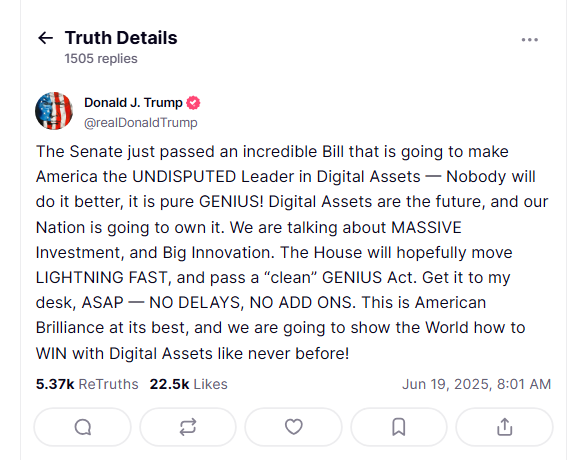Trump Declares GENIUS Act Will Secure US Dominance in Digital Assets
Move over, Wall Street—the crypto revolution just got a White House endorsement.
In a move that sent shockwaves through both political and financial circles, former President Trump has positioned the GENIUS Act as America's golden ticket to blockchain supremacy. The bill—now gaining traction among crypto advocates—could redefine how the US competes in the global digital economy.
Why it matters: While DC bureaucrats debate stablecoin regulations, this legislation cuts through the red tape with a pro-innovation framework. No more waiting for Congress to 'understand the tech'—it's a playbook for attracting blockchain talent, startups, and yes, even those hedge funds still pretending they 'get' DeFi.
The cynical take: Watch legacy finance scramble to rebrand their ETF desks as 'digital asset divisions' once the money starts flowing. Some things never change—except maybe who controls the future of money.
Trump Urges Quick Approval
Based on reports, Trump wants a “clean” version of the Guiding and Establishing National Innovation for US Stablecoins (GENIUS) Act to sail through the House.
He warned members like Congressman French Hill against altering the Senate text or folding it into a larger crypto package. The Senate approved the bill one day before his post, setting a clear deadline: get it to my desk “ASAP.”

House Faces Important Choice
Representatives are weighing two paths. They can approve the Senate bill as is or merge it with a broader set of crypto rules. French Hill and other House Republicans backed a similar measure in April, but this version has key differences on reserve requirements and registration steps.
Some worry that a standalone vote could undercut efforts to address token securities, DeFi and exchange oversight all at once.
Senator Bill Hagerty, the bill’s sponsor, told reporters he hopes to send the GENIUS Act to Trump before July 4th. He warned that if the House adds “market structure” language, the entire package WOULD need to return for more Senate review.
Months of tough talks in the upper chamber narrowly secured enough GOP support—and some Democratic votes—to pass the legislation under the 60‑vote threshold.
Competition With Other JurisdictionsAccording to industry experts, clear US rules could help stablecoin issuers like Circle and Paxos avoid a patchwork of state licenses. The EU, Singapore and Hong Kong are already drafting their own frameworks. Without swift action, these firms may relocate overseas, taking banking ties and talent with them.
Based on reports from crypto groups, lobbyists have ramped up calls for federal clarity. Some warn that piecemeal bills could leave gaps in reserve audits or consumer protections. Others argue a narrow stablecoin law is better than none—and could pave the way for broader reforms later this year.
Featured image from Unsplash, chart from TradingView

